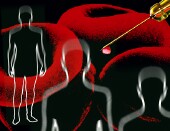 |
 |
 |

First-Ever Mapping of Cancer Patient's Genome
Study of leukemia patient's DNA may lead to routine gene scans, experts say|
|
HealthDay
Wednesday, November 5, 2008
 WEDNESDAY, Nov. 5 (HealthDay News) -- In a genetics first, researchers report that they have decoded the complete DNA sequence of a person with acute myelogenous leukemia.
WEDNESDAY, Nov. 5 (HealthDay News) -- In a genetics first, researchers report that they have decoded the complete DNA sequence of a person with acute myelogenous leukemia.
There were some surprises -- eight previously unknown mutations, along with two already identified genetic alterations, were associated with the blood cell cancer.
But more importantly, it is now possible to detect individual genetic differences for each case of cancer, said study senior author Richard K. Wilson, director of the Washington University Genome Sequencing Center, in St. Louis.
"We found mutations in genes that make a lot of sense when normal cells become cancer cells," Wilson explained. "That they seem to be fairly unique to this particular patient says on the one hand that this is a complicated disease. But the complications validate our approach -- we have to look at a number of patients to see not only what is different but what they have in common."
The feat brings the routine use of genomic screens for cancer patients a little closer, one expert said.
"Technically, this is a great achievement," added Richard Gibbs, director of the Human Genome Sequencing Center at Baylor College of Medicine, in Houston. "This really is a new era, based on genome studies. There is real clinical applicability, and that is what's remarkable about it."
The findings were reported in the Nov. 6 issue of Nature.
The Washington University center has already started genetic sequencing of a second person with acute myelogenous leukemia (AML), which Wilson said was chosen in part because "it is a cancer type that is extremely aggressive, with no good cure. We have seen some pretty good treatments for other cancers, but this one lags behind."
"The second [patient genome] is already in progress," he said, adding that the examination of the genomes of other patients is already underway.
While it cost millions of dollars and years to complete the first map of a single human genome, in 2003, such feats are now becoming routine because of "a new wave of technologies," Wilson noted. "It miniaturizes and parallelizes, so we can do lots of things in parallel on one platform. We used to be able to look at 100 DNA sequences per sample. Now we can look at 100 million per sample."
The genome laid out in the Nature study is that of a woman in her 50s who died of AML. The current picture is that mutations that turn a cell cancerous occur in sequence, each one pushing the cell closer to uncontrolled, malignant growth. Nine of the mutations in the woman's case were found in all tumor cells. The tenth was not present in all, and so it is believed to be the last one that occurred, possibly the tipping point that caused the cancer.
The complexity of the genetic changes linked to this one case of AML should not be viewed as discouraging, Gibbs said. "I don't think there is reason for pessimism," he said. "It is complicated, but that doesn't mean we're not going to understand it."
New technology may someday make it possible to perform genome sequencing for all cancer patients who need it, Gibbs said. "In the past, our ability to get the information has been questioned," he said. "When it was $10 million a shot, that was one thing. If it costs $5,000 or $10,000 per case, there is no argument about getting the information."
The Baylor center is carrying out similar genome studies for several forms of cancer, Gibbs said, including the brain tumor glioblastoma, lung cancer and pancreatic malignancies. And at Washington University, whole-genome studies are planned for breast and lung cancers, Wilson noted.
HealthDay
Copyright (c) 2008 ScoutNews, LLC. All rights reserved.
Related News:
More News on this Date
Related MedlinePlus Pages:
| Home | Health Topics | Drugs & Supplements | Encyclopedia | Dictionary | News | Directories | Other Resources | |
| Disclaimers | Copyright | Privacy | Accessibility | Quality Guidelines U.S. National Library of Medicine, 8600 Rockville Pike, Bethesda, MD 20894 National Institutes of Health | Department of Health & Human Services |
Date last updated: 06 November 2008 |




